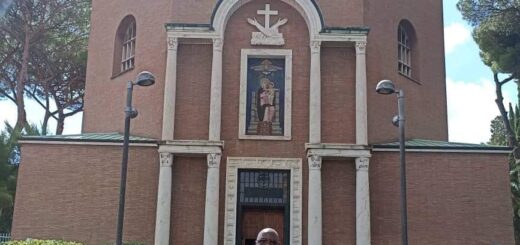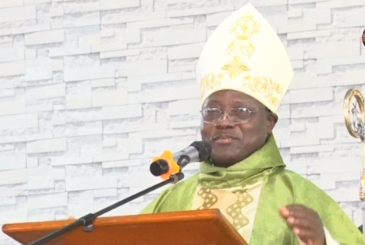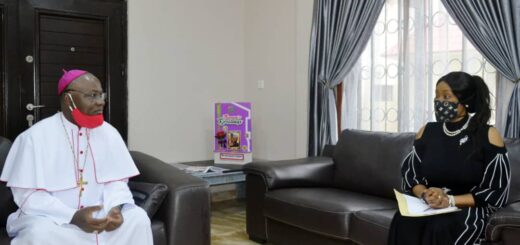VISIT TO ACN CANADA: A WORD OF HOPE AMIDST VIOLENCE & PERSECUTION
The Archbishop of Jos visited Canada at the invitation of Aid to the Church in Need (ACN) from June 8 to 14 and met, spoke and prayed with benefactors, archbishops and clergy and other interested parties from Vancouver, Toronto, Ottawa, Gatineau and Montreal.
Report by ACN Canada Information Department
From June 8th to 14th, Aid to the Church in Need Canada had the good luck and pleasure to welcome a direct witness to the persecution against Christians, who, for close to twenty years, has been a passionate advocate of interreligious and interethnic dialogue, Msgr. Ignatius Kaigama.

Msgr Kaigama after Mass in Toronto
“This man is endowed with incredible strength,” says Marie-Claude Lalonde, ACN National Director. “Despite all of the reasons he has to be angry, he preaches peace with his words and his life choice. He chose the nonviolent option, which was not obvious given his personal story.”

Msgr Kaigama gives a Homily at Saint Patrick’s Basilica in Montreal
In fact, during meetings held in Vancouver, Toronto, Ottawa, Gatineau and Montréal, Mgr. Kaigama revealed that his tribe was affected by a previous jihad in 1804. Later on, in 1892, several members of his tribe were assassinated or enslaved, historic events not well known in the West. ” It was Fulani shepherds – Muslims – who attacked the stronghold where my tribe had sought refuge,” recounted Mgr. Kaigama. “I would have every reason to be angry.” In addition to his family story, the archbishop found himself at the heart of an episode of rare violence, right after the tragic events of September 11, 2001.

Marie-Claude Lalonde, Msgr Kaigama and Mgr Lépine, Archbishop of Montreal
Creating dialogue
When he was named Archbishop of the Diocese of Jos in April 2000, Mgr. Kaigama thought that he would be able to catch his breath. “I thought I would be able to rest,” he told us. The fact is, since February 3, 1995, he had spent a lot of energy in creating a new diocese, Jalingo. But in September 2001, this town of the Middle Belt caught fire, even though it has the reputation of being in a moderate environment, in a Nigeria that is split in two: the Muslim North and the Christian South.
Following the September 11 tragedy, the town of Jos caught fire. In 10 days, more than 1,000 people were killed. “My people were killed, my church burnt, my house destroyed, the vehicles we were using to go to remote and difficult places were all burnt. I always tell people that no one should be angrier than I! When my church was attacked, 14 people were killed; I saw their bodies at my feet. I should be the angriest person,” he repeats. But I said to myself: ‘When you are angry, you are hurting yourself most of all. Let’s find a way to talk.’ And that’s how I got into the dialogue, calling on reasonable Muslims and leaders [from all walks of life] to sit together and find solutions for every situation: what can we do to avoid crises? How can we get our people to embark on constructive dialogue when there is a problem so they don’t get into hostile confrontation?”

Archbishop Prendergast of Ottawa with Archbishop Kaigama of Jos
Being a credible witness
Msgr Kaigama continues to be misunderstood by several of his compatriots and co-religionists. After all, not many Christians would dare to sleep at an Imam’s or pray at a mosque with Muslims or even attend a wedding. Some find it too weak, others, naive and a waste of time in a fight they consider already lost.
“In Africa [for the last few years], the seeds of discord and distrust have been sown, especially in Nigeria … where the Sharia was implemented in nine States,” he stated. “However, as a Christian, my duty is to do what Jesus asked me to do: He is the Light, the Truth and the Life. If I cannot follow his path, I have no reason to be what I am. I always tell my people: ‘Let’s get back to the origins [of our faith]. Following violence, the young people come to us, especially the religious leaders. They say: ‘Buy weapons for us!’ So I say: ‘If I have to fight with weapons, what does the Word ‘I give you my peace, I leave you my peace’ mean. I tell them that it’s not my mission. Even if it’s difficult – [especially] when someone has lost their father, their mother, their whole family – we try to pacify them and call on the government to do something about it.”

Msgr Kaigama with Cardinal Collins, Archbishop of Toronto
Msgr. Kaigama continues his work in favour of dialogue in Nigeria. He is one of the founders and promoters of the Dialogue, Reconciliation and Peace Centre, located in Jos. In October 2017, he organized an interreligious prayer for peace with other religious leaders.
“We are keeping Msgr. Kaigama in our hearts and pray that his work bears fruit!” says Ms. Lalonde. “I invite our benefactors to pray for him and his mission, trusting that God can bring peace to even the most hardened of hearts. For Mgr. Kaigama, the words of the Gospel ‘Love your enemies, do good to those who hate you’ make sense.”
As reported by B. C CATHOLIC:
In the 23 years since Archbishop Ignatius Kaigama became a bishop, he has not taken one day off from promoting dialogue and peace between Christians and Muslims.
“If there is anybody who should be advocating a violent response to Muslim attacks, it should be me,” he told The B.C. Catholic June 7. “I have experienced it in my ethnic group and from my work as a priest. I should know. My people have died in front of me.”
In 2014, the world was shocked when more than 270 girls from the primarily Christian Nigerian town of Chibok were kidnapped by terrorist group Boko Haram, forced to convert, and held for ransom.
It wasn’t an isolated incident, and violence, terrorism, and corruption are still daily realities in Nigerian communities. In January, a mass funeral was held for 72 people killed during a fight between what appeared to be mostly Muslim cattle herders and mainly Christian farmers on New Year’s Day. About three months later, 19 Christians were killed when gunmen opened fire at Mass and set fire to about 50 homes in a remote village. Among the dead were two priests.
“It has always been a challenge. There has never been a peaceful moment.”
But despite his anger, Archbishop Kaigama says violence will only lead to more violence. So, since his ordination at the age of 36, he has been promoting peace and interreligious dialogue. “Either we do something, or we perish together.”

The work has been incredibly difficult. The Archbishop of Jos said his people have been “allergic” to the concept of dialogue and feel as though talking with perpetrators means letting them off the hook.
He remembers when suicide bombers attacked a church in his archdiocese in 2012. It was a Sunday, the church had been full, and 14 were killed in the explosion.
“Everybody was so angry. They said: ‘Let’s fight. Let’s kill.’ They wanted the bishop to give the word. Everybody was very angry. They were even angry with the police and security agents. They felt betrayed.”
When Archbishop Kaigama arrived at the scene, a local police commissioner stuck by his side, fearing the angry crowd.
“I could still see the remnants of the terrorists, the building was still on fire, there was smoke still there. So what do you do? Ask them to fight? They will begin to kill innocent passersby, anyone who looks like a Muslim,” he said.
“So, I told them: ‘Look, I am more angry than anybody here. If I had to do something, I would do something worse than any of you here. But what would we make of our religion? What is the core of our religion? Let us recite the Our Father.”
He continued: “There are 14 people dead now. If I say ‘fight,’ by tomorrow, we’ll have 50 or 100 dead, on both sides. So, who will gain?”
In 10 years, Archbishop Kaigama has not held a Eucharistic procession on the feasts of Corpus Christi (or Christ the King), worried it would take only one Muslim unhappy with the procession to throw a stone and a bloodbath would start in the streets.
“A small thing, even a small problem, even just the young people could be angry about something, (but) if they start fighting and one is a Christian and one is a Muslim, it becomes a Christian-Muslim fight. People can die for that.”

Government officials seem too preoccupied by their own interests (bishops in Nigeria have publicly called for president Muhammadu Buhari to resign), and even local police and military can’t control the situation, said Archbishop Kaigama. When he was the bishop of Jalingo, he was often called by soldiers to help them deescalate a situation.
“Soldiers would come to beg me to go to a crisis area to talk to the people. Their guns had failed them, and they said they would give me protection, lead me, so I could talk and pray.”
When he was ordained the Archbishop of Jos in 2000, he thought he was going to “take a good sabbatical,” but soon found the situation there was even more dramatic. “Whether I liked it or not, I had to be involved. It wasn’t a choice at all. I never studied anything to do with Islam or dialogue or justice issues.”
In this tense climate, Archbishop Kaigama seeks ways to promote peace between Christians and Muslims. He has befriended local Muslim chiefs and opened a school where members of both faiths can get a free education in building or carpentry while learning how to get along.
“They are eating together, learning together, and they try to be friends and cultivate the discipline of sitting down when there is a problem, rather than taking a bow and arrow or a gun,” he said. “So, at least if in one village there is a crisis, and someone is able to say: ‘let’s reason, let’s talk’ – it’s better than nothing.”
He added that while he does not encourage his flock to fight, he does tell them Christians are not to stand by if their families are being slaughtered.

“If somebody comes to attack your family, you have a right to defend your children, your wife, your husband. If they are attacking your church, also, you have the same right to use the instruments you have to protect your church,” he said.
“But do not wait for your bishop to say: ‘Let’s go and buy 2,000 different types of guns and buy bullets.’ That is impossible. That is not my work. When I do that, I fail.”
The Muslim chief who invites Archbishop Kaigama to his home for dinner, the young graduates from the interfaith school, and others, give him hope that peace is possible.
“We have some Muslims who reason and who condemn violence. I call them candlelight. The difference between electricity and candlelight is clear! But a candle is enough to give a little bit of light.”
Archbishop Kaigama visited Vancouver for two days on a trip sponsored by Aid to the Church in Need, a pontifical charity for Catholics suffering poverty or persecution.
In a 2015-2017 report, ACN said the situation of Christians in Nigeria has worsened and the persecution they face is “extreme.” It added that the Kafanchan Diocese (one of Nigeria’s 55 dioceses) reported 988 people killed, 2,712 homes destroyed, and 20 churches attacked from 2011-2017.
Archbishop Kaigama, a first-time visitor to Canada, celebrated Mass and gave a speech at the John Paul II Pastoral Centre in Vancouver June 8 before also travelling to Toronto, Ottawa, and Montreal.





